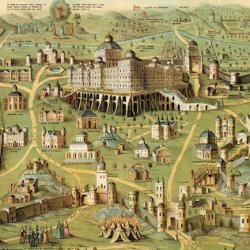The hymn in praise of Solomon’s wisdom at the end of 1 Kings 4 makes a number of points. First, Solomon?s wisdom is rooted in his ?heart?E(v. 29), which has the discernment that the Lord had promised him.
Second, Solomon?s wisdom matches the breadth of his kingdom. He had asked for wisdom because he thought himself incapable of ruling the ?vast people?Eover which Yahweh had made him king. Now, he is said to have a vastness of heart that matches the people ?Eboth are described as being like the sand on the seashore. Numerological patterns in these verses also reinforce the unsurpassed character of Solomon?s wisdom. Six phrases are used to describe the breadth of Solomon?s wisdom (wisdom, discernment, abundant, very, breadth of heart, as the sand), and the word ?wisdom?Eis used seven times in these few verses (vv. 29, 30 [3x], 31, 34 [2x]).
Solomon is compared to the ?sons of the east,?Eprobably Babylonian sages who were famous throughout the ancient world, and to the sages of Egypt. Climactically, though, Solomon is compared to four specific men: Ethan, Heman, Calcol, and Darda. Two of these are listed as Psalm writers in the Psalter: Ethan the Ezrahite composed the maskil of Psalm 89, and Heman wrote Psalm 88 and is listed as a Levitical musician in 1 Chronicles 6:33. The others appear to match the two men listed in 1 Chronicles 6:33 as sons of Zerah. Even before Solomon, Israel had its own sages, and Solomon no doubt knew at least Ethan and Heman, perhaps as instructors in his youth. Further, the narrator of Kings sets up these four men as the greatest of the sages ?ESolomon was greater than Babylon, even Egypt, even the great sages of Israel. This list also shows that wisdom is manifested in composition of song, in musical skill, as it is with David and with Solomon himself (v. 32).
Numerological structuring is also evident in this list. Solomon is compared to three general sets of men, and then to four specific men: sons of the east, sons of Egypt, all men, and the four Israelite sages. Solomon is perhaps the ?eighth?Ehere, the one who surpasses knowledge of the ?sevenfold?Ecreation and the ?sevenfold?Esages. It is significant that there are four sages of Israel as well, for these form the ?cornerstones?Eof the house of wisdom that existed prior to Solomon.
Solomon?s wisdom, as mentioned above, encompasses all the classes of things that are laid out in the creation (4:33-34). Again, we have a numerological pattern: Three forms of plant life (the generic ?tree,?Eand then the poles of vegetation, cedar to hyssop), and four classes of animals, which match the four classes that are laid out in Genesis 1. Solomon?s mind is as big as the creation itself. He has the mind of Christ, his creator.













